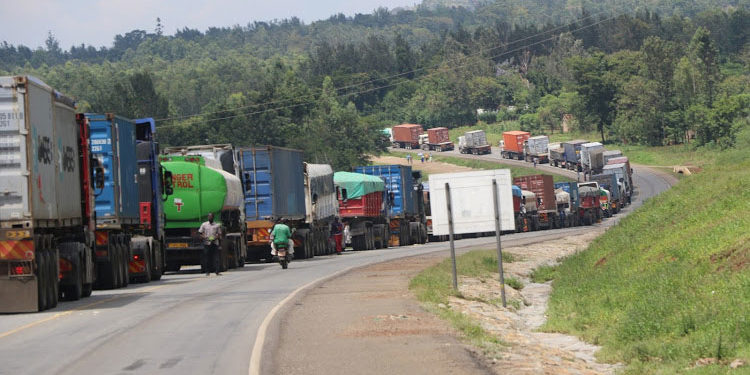The flow of the cargo along the Northern Corridor has improved significantly due to the increased Covid 19 testing capacity at Mombasa as well as border points in a move that is expected to improve truck turnaround and reduce the cost of transit transport.
The Kenya Transporters Association (KTA) Chief Executive Officer (CEO) Mr Dennis Ombok, said that although the test results were taking up to 3 days to come out, at least more tests are being carried out in a day. The congestion at the Miritini testing facility has eased up since testing at border posts have improved significantly.
“A truck driver having a Covid 19 certificates that is varied can load cargo from Mombasa and have the test carried out at the border in the event the certificate expires along the way. This has eased stress at Miritini facility,” Ombok said, adding that this has also eased the huge traffic at the border posts witnessed a few weeks ago.
Early last month, transporters got a huge relief after the crucial Miritini testing centre enhanced capacity to test more truck drivers. The county government added two more testing booths tripling the facility’s capacity.
The CS in EAC Ministry, Adan Mohammed, asked the Miritini testing centre in Mombasa to increase the number of daily tests to meet a high demand of 600 daily transit truck drivers
However, the issue of valid Covid free certificates acceptable in all the EAC countries still remains a challenge since the regional countries have not yet agreed on this.
The EAC secretariat recently rolled out the Regional Electronic Cargo and Drivers Tracking System (RECDTS) that will help in cross- border sharing of Covid 19 free certificates electronically in what the industry player touts as a game-changer in addressing the current delays across various border points.
The system is currently being piloted and the sensitization carried out before it is eventually rolled out to all the transporters in the region.
“It is important to know that from 24th July 2020, all Covid 19 certificates for cross border track drivers shall be issued from RECDTS platform and the EAC wishes partner states to officially inform all transporters about this regional initiative and sensitize them to have drivers registered in the mentioned system,” EAC secretariat said in a letter addressed to all Permanent Secretaries responsible for EAC affairs in EAC region that was also copied to their counterparts in Ministry of health in Kenya, Uganda, Tanzania, Rwanda, Burundi and South Sudan.
This initiative has received support from Trademark East Africa (TMEA) in partnership with the East African Community (EAC). The Federation of East African Freight Forwarders Associations (FEAFFA) the regional private sector apex body of the Customs Clearing and Freight Forwarding industry mobilized private sector logistics associations to participate in the review of the RECDTS system concept. Initially, FEAFFA together with the National Logistics Platform (NLP) in Uganda proposed a journey management system (JMS) to combat spread of covid19 by truck drivers. The JMS concept enhanced the RECDTS which has since received support from industry stakeholders in the region.
Although the region has been using Regional Electronic Cargo Tracking System (RECTS) for tracking cargo movement along the corridors, the system lacked a component of tracking individuals, which has become necessary in the wake of Covid 19 pandemic to manage their behaviors and overall welfare.
This system will enhance the safety of drivers along the way and also harmonize activities and promote mutual recognition of COVID-19 tests among EAC partner states.
The new system will give the industry a sigh of relief following serious delays at border crossing that has increased truck turnaround and the cost of transport
Recently released statistics by the Shippers Council of East Africa (SCEA) showed that the cost of transporting cargo from Mombasa to Kampala has gone up by an average of USD1000, USD 1400 for Kigali, USD 2000 for Bujumbura and 2400 for Juba.
While it took an average of 2-4 days for a return journey to Kampala in last year, the Covid 19 period has seen this rise to 7-9 days. In Kigali, it is taking 14-16 days up from 7-8 days in 2019.
Transporters took 9-10 days to reach South Sudan but now they need 21-26 days for the journey, SCEA said. From Mombasa to Bujumbura, from an average of 9-10 days in 2019, transporters require 19-20 days.
The resultant delays have led to a huge surge in cost of transport. The cost of moving transit cargo has gone up by a huge margin with Kampala recording a US $ 1000 increase, Kigali $ 1400, South Sudan US$ 2800 and US$ 2000 in Bujumbura.




